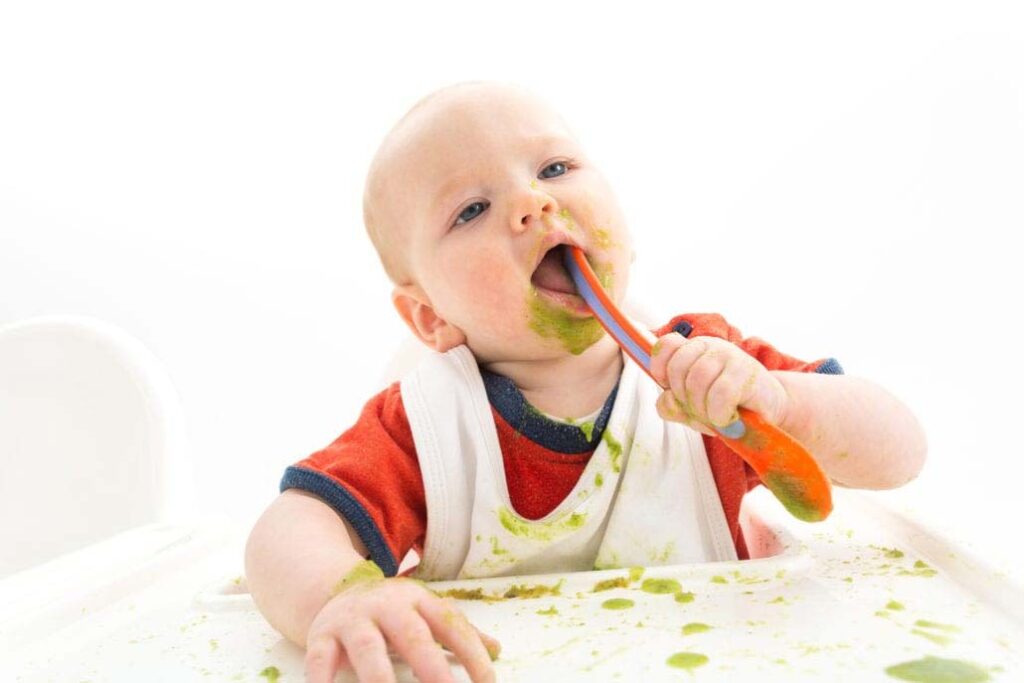Feeding babies shouldn’t feel like navigating a maze, but unfortunately in recent years it has felt just like that. For years, I’ve spoken about the need for clearer, evidence-based guidance around the nutritional quality of commercial baby foods. So, I’m genuinely pleased to see the new voluntary government guidelines taking shape, in their new Commercial Baby Food and Drink: Voluntary Industry Guidelines. Offering a little more direction on sugar, salt, labelling and marketing for baby and toddler foods.

Why these guidelines matter?
Until now, we’ve had very little regulation around the actual nutritional content of baby foods. While the 2003 legislation (The Processed Cereal-based Foods and Baby Foods for Infants and Young Children (England) Regulations 2003) covers general requirements on the manufacturing and composition of baby foods and information about pesticide, added nutrients and a bit about labelling, it doesn’t cover anything about the levels of salt and sugar or anything in relation to marketing.
Additionally the baby food market has changed considerable since 2003, and recent reports (PHE and Which) highlight clear inconsistencies between evidence-based advice on feeding babies and toddlers and the commercial foods that are actually available for this age range.
These new guidelines aim to change that. They recommend:
- No added salt or sugar in foods for babies under 12 months
- Clear limits on the percentage of fruit and sugars allowed in certain product categories e.g. a 5% limit on fruit content by weight in main meals and less than 10g of total sugar per 100g in desserts and breakfasts for kids.
- Encouragement for brands to create more vegetable-based dishes, use bitter flavours, and offer a variety of textures
Amongst other recommendations. This is a big step forward from what we currently have. It’s about levelling the playing field and giving manufacturers a fair framework to work from, while ensuring that foods marketed for babies genuinely support their health and development.

Free Sugars and what parents need to know
One of the biggest uncertainties I hear from parents is around the term “free sugars” – especially in fruit-based pouches and purées. And rightly so. As I’ve written in my blog on free sugars and baby food pouches, free sugars are those sugars added to foods or released during processing—like when fruit is puréed to a smooth texture. These sugars are absorbed quickly, don’t keep babies full for long, and can contribute to tooth decay and poor dietary habits later on.
That’s why I always recommend:
- Offering fruit in its whole form where possible
- Combining fruit purées with other foods like yoghurt or oats
- Avoiding overly smooth textures for too long—babies benefit from learning to manage lumps and variety early on
- Serving purées from a bowl and spoon, not sucked through a pouch
Honest labelling and clear messaging on baby foods
The new Government guidelines also touch on marketing and labelling of commercial baby foods. This is another area that’s long needed attention. They recommend:
- Labelling foods as suitable from 6 months (not earlier)
- Avoiding misleading claims or exaggerated health benefits
- Providing clear serving instructions (e.g. not through a spout) on the front of the packet
- Not marketing snack foods as suitable for babies under 12 months
In my opinion this is also about building trust. Parents deserve transparency when choosing foods for their little ones. Honest labelling helps families make informed choices and reduces confusion at a time when feeding can already feel overwhelming.

What this new report means for families?
These guidelines are voluntary, but they send a strong message to industry: we need better. Better ingredients, better labelling, better support for parents. And MUCH more alignment in the Government’s current advice around feeding young children and the food that is readily available to them.
As someone who works with families every day, I know how much this clarity will mean. Feeding babies isn’t just about nutrition, it’s about confidence, connection, and a lot of support. And these changes are a step in the right direction.
Clearer labelling and lower sugar for babies and toddler food isn’t just good policy, it’s good parenting support.